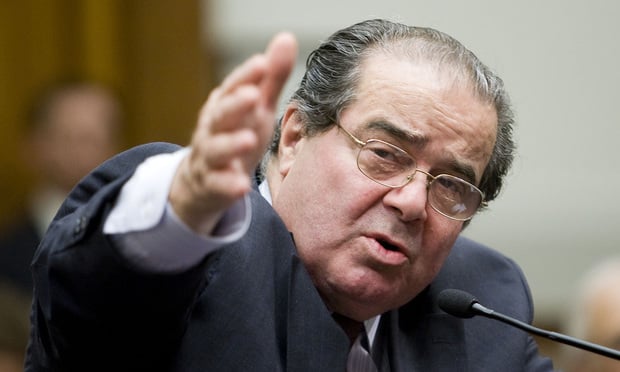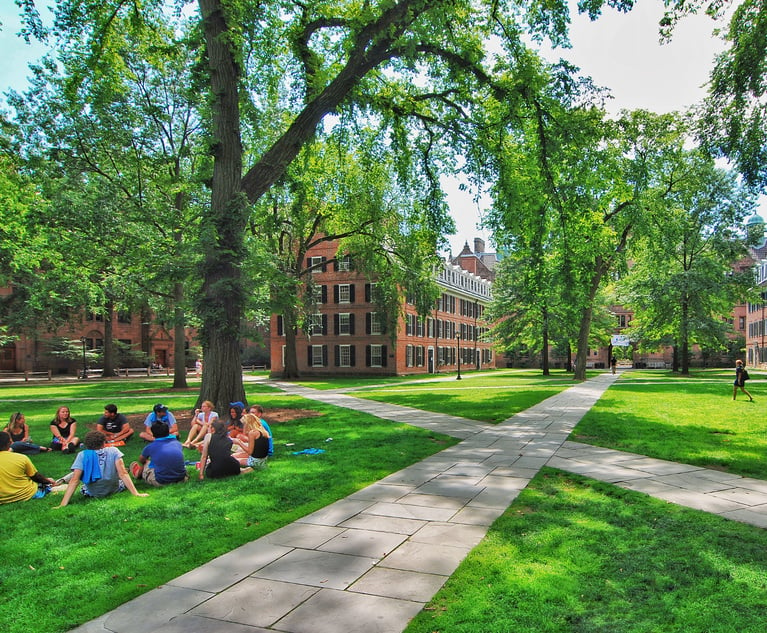'Justice Stevens Improved Everyone's Game': Former Clerks Remember Mentor
"He didn't view others based on position or stature. He just wanted to do good and care for people," one former John Paul Stevens clerk says about his boss, who died Tuesday at age 99.
July 17, 2019 at 10:16 AM
11 minute read
The original version of this story was published on National Law Journal
 Supreme Court Justice John Paul Stevens moderating a panel discussion at the Newseum on Feb. 26, 2009. (Photo: Diego M. Radzinschi/ ALM)
Supreme Court Justice John Paul Stevens moderating a panel discussion at the Newseum on Feb. 26, 2009. (Photo: Diego M. Radzinschi/ ALM)
From Justice John Paul Stevens's competitive tennis matches with his clerks to his preference for supermarket sheet cakes, the justice, who died Tuesday at age 99, left a treasure trove of memories with his former clerks.
The justice died in a Fort Lauderdale, Florida, hospital from complications of a stroke he had suffered earlier this month.
We reached out to former Stevens clerks about memories of their Supreme Court days in the chambers of the justice, who was described universally as “one of a kind.” Here's what some of the lawyers told us, in their own words:
>> Amanda Leiter (2003-2004), American University Washington College of Law: “I remember him coming in from tennis games in shorts and knee-high athletic socks, chuckling (at 83) about beating his 75-year-old opponent; appreciating my pride as my 9-month-old learned to navigate steps by risking his life on the court's marble staircases; teaching a fellow OT03 clerk's young son to tie a bow tie. He was a wonderful man, so thoughtful, funny, and upstanding, a moral compass the world will sorely miss.”
>> Melissa Arbus Sherry (2004-2005), Latham & Watkins: “My favorite memory of Justice Stevens was the morning he picked me up to play tennis the year I was clerking. He was in his 80s then, and I was in my 20s, but he beat me (badly) in a singles match. He had so much energy and competitive spirit—and it was all so genuine. He was truly one of a kind.”
>> Chad Golder (2006-2007) Munger, Tolles & Olson: “During the term I clerked for Justice Stevens, my mother was diagnosed with breast cancer. I remember walking into the Justice's office to tell him the news and that I might have to travel home a bit more regularly. He was typically caring, thoughtful, and compassionate. More unexpectedly, he immediately reached for his phone to call Justice O'Connor. He said to me: 'Let me get Sandra on the phone. She should talk to Sandra. Sandra probably has good advice.' I told him that my mom didn't need to speak with Justice O'Connor, and that she would be okay. He was insistent, but I was able to persuade him this act of kindness was unnecessary. That was the kind of man he was. He didn't view others based on position or stature. He just wanted to do good and care for people. I will miss him terribly.”
>> Ian Gershengorn (1994-1995), Jenner & Block: “He spoke often of his experience as a clerk with Justice [Wiley] Rutledge, and he loved to talk of former justices he admired. The care and attention he gave to each and every case—he was often the lone dissenter in what seemed the court's least controversial cases—conveyed to the clerks the notion that the court's reputation was one we each had an obligation to uphold. This struck home at the end of the clerkship when he gave each clerk a photo inscribed 'To my friend and former clerk—with appreciation and affection.' He told us Justice Rutledge had used that same inscription on the photo Justice Stevens received at the end of his own clerkship. It was Justice Stevens' way, I think, of welcoming each of us into his own 'clerk family' and tying us to the history and tradition of the court he so loved. Justice Stevens was a brilliant Justice and a wonderful boss, a man who always came to work with a twinkle in his eye. His passing is a loss for the court and the country, and I will miss him dearly.”
 Justice Antonin Scalia (2010) Photo by Diego M. Radzinschi/THE NATIONAL LAW JOURNAL
Justice Antonin Scalia (2010) Photo by Diego M. Radzinschi/THE NATIONAL LAW JOURNAL>> Sonja West (1999-2000), University of Georgia School of Law: “Sometimes when Justice Stevens was pondering a point in a case, he would consult with another justice. 'Maybe you could call Justice [David] Souter,' we would suggest, 'or visit Justice [Ruth Bader] Ginsburg?' But his typical reply was, 'No, I'm going to talk to Nino. I want to hear what Nino thinks.' Yep, that's right, to our surprise it was usually Justice Scalia's views he sought, because he craved the viewpoint of someone who would most challenge his thinking. Our chambers were next door to Justice [Clarence] Thomas's. The two justices were the only real sports fans on the Court at the time. I have so many memories of the two of them standing in the hallway outside our chambers, chatting about football or baseball and always laughing—Justice Thomas with his booming, guttural laugh and Justice Stevens with his gentle, friendly chuckle. They could hardly be more different, yet friends nonetheless.”
>> Joseph Thai (2000-2001), University of Oklahoma College of Law: “On Justice Stevens' birthday during the 2000-2001 term, we clerks got him a simple sheet cake from the supermarket, which he was rumored to prefer over fancier confections. When, after a small in-chambers celebration, we asked him for the secret to his longevity, he chuckled, 'Not eating stuff like this every day.' However, I believe the real ingredients to Justice Stevens' longevity were his happiness, humility, and hard work serving our nation as a judge as impartially as he humanly could. It was a job in which he neither had a theory nor a ready answer for all the hard questions. Instead, he seriously and joyfully devoted himself to 'learning on the job' almost every day, reading the briefs, discussing the cases with his clerks, and writing his own first drafts so that he could see whether his preliminary thinking stood up in the writing. And when disappointments arose—and none was bigger during my clerkship than the blocked recount of votes in Bush v. Gore—Justice Stevens could rejuvenate himself and cheer up his despondent clerks afterward with a sigh, a chuckle, and a suggestion to throw our papers into 'the circular file' and turn to the next case that beckoned.”
>> Michael Gottlieb (2004-2005), Willkie Farr & Gallagher: “In 2005, just before the end of my term clerking for Justice Stevens, the justice received an invitation to throw out the first pitch at Wrigley Field, the same stadium where he had watched Babe Ruth call his shot in the World Series more than seven decades earlier. The justice—a devoted Cubs fan throughout his life—was delighted, but nervous. So he decided to practice. And that is how, in my final days working for the greatest living jurist, I found myself having a catch with him in the Supreme Court gym. I did not attend the game. But this much I have always known: Just as surely as Babe Ruth called his shot, Justice Stevens threw a strike.”
>> Deborah Pearlstein (1999-2000), Yeshiva University Benjamin N. Cardozo School of Law: “I'd been at the court for all of about two weeks when it was my turn as desk clerk on a last minute motion for a stay of execution. I'd been instructed to call the justice at home late at night, wake him up if need be, so he could vote. I had to wake him from a sound sleep to make what I'd hoped was the strongest case I could on the prisoner's behalf; it seemed the least I could do. The call was a short one. The justice was clear he would vote against; indeed, as I'd realize later, none of the justices would have (or did) vote to grant the stay. The next morning, the justice came into my office and sat down in the chair across from my desk—to apologize if he'd seemed curt. 'You get baptized pretty quick in this business,' he said with regret, 'I sometimes forget that.' But he hadn't really forgotten. He never did.”
>> Gregory Magarian (1994-1995), Washington University in St. Louis School of Law: “I remember once I made an innocent but potentially damaging mistake in helping him draft an opinion. When he learned about my error, he told me about it without a trace of anger or impatience. 'We'll correct it in conference; don't worry,' he said, and that was the last I ever heard of it. Another time, I got carried away with indignation and wrote some absurdly militant language into a draft of his dissent in a death penalty case. 'Good work,' he said in his typically genial tone, 'but I just want to change a few things you wrote here at the end.' Those of us who were lucky enough to know him can bear witness to his abiding decency. He was kind, well-adjusted, and humane. He treated everyone around him like a human being. When you met him, you couldn't stay nervous; he put everyone at ease. He was comfortable exercising the power of his office, but that power never went to his head.”
>> Kate Shaw (2007-2008), Yeshiva University Benjamin N. Cardozo School of Law: “What was so remarkable about the way he treated his law clerks was how seriously he took us, even after he had been on the bench for decades. He seemed to approach each of us with the presumption that we were up to the task of this awe-inspiring job; that we had views that merited his careful consideration. And I think that all of us, simultaneously thrilled and terrified by this, somehow rose to the occasion. There was no real alternative. And it wasn't just his law clerks—this was the spirit with which the justice approached everyone. He'd zero in on weaknesses in arguments (much as he'd invariably circle typos when they made their way into our cert memos), but he also seemed to extend to everyone, from his colleagues on the court to the lawyers arguing before him, this same presumption of good sense and good faith. And I think that, like his law clerks, others who found themselves on the receiving end of this incredible trust responded by working to earn it: Justice Stevens improved everyone's game.”
 Protesters outside the U.S. Supreme Court on the day the Court heard arguments for Bush v. Gore. Dec. 11, 2000. (Photo: Patrice Gilbert)
Protesters outside the U.S. Supreme Court on the day the Court heard arguments for Bush v. Gore. Dec. 11, 2000. (Photo: Patrice Gilbert)>> Andrew Siegel (2000-2001), Seattle University School of Law: “I clerked for him during October Term 2000, the contentious year that will forever be known for Bush v. Gore. In the cauldron of that case and amid the accumulated frustrations of a half-dozen years as the most senior member of the court's embattled left wing, the Justice gave a master class in grace and tenacity whose lessons I have only gradually unpacked in the intervening years. He was insistent about us making time for family and other obligations, but also deeply respectful of the value of privacy and professional distance. When young and foolish clerks did young and foolish things, like over-reacting to draft dissents or, in my case, mocking the cert-worthiness of a case that the Justice found appealing and meritorious, he was deft in providing guidance that stuck but did not sting. When clerks reached him via phone (or in one memorable instance during our term via airport page) to breathlessly report the latest outrage, he instinctively brought down the temperature, offering the perspective of someone with decades of experience in the game, before providing sound tactical and substantive guidance, honed through that same experience.”
Read more:
Justice John Paul Stevens, Who 'Left Us a Better Nation,' Dies At 99
The Justices Had 5 Votes to Overturn 'Roe' in 1992. Why That Didn't Happen.
Justice Stevens, in New Essay, Laments Washington's Partisanship
Thomas Calls the 2nd Amendment a 'Constitutional Orphan.' Stevens Says Get Rid of It
John Paul Stevens, Lifelong Cubs Fan, on Staying Up Late for 'Wildest' Game
This content has been archived. It is available through our partners, LexisNexis® and Bloomberg Law.
To view this content, please continue to their sites.
Not a Lexis Subscriber?
Subscribe Now
Not a Bloomberg Law Subscriber?
Subscribe Now
NOT FOR REPRINT
© 2025 ALM Global, LLC, All Rights Reserved. Request academic re-use from www.copyright.com. All other uses, submit a request to [email protected]. For more information visit Asset & Logo Licensing.
You Might Like
View All



Trump's Inspectors General Purge Could Make Policy Changes Easier, Observers Say
Trending Stories
- 1Rejuvenation of a Sharp Employer Non-Compete Tool: Delaware Supreme Court Reinvigorates the Employee Choice Doctrine
- 2Mastering Litigation in New York’s Commercial Division Part V, Leave It to the Experts: Expert Discovery in the New York Commercial Division
- 3GOP-Led SEC Tightens Control Over Enforcement Investigations, Lawyers Say
- 4Transgender Care Fight Targets More Adults as Georgia, Other States Weigh Laws
- 5Roundup Special Master's Report Recommends Lead Counsel Get $0 in Common Benefit Fees
Who Got The Work
J. Brugh Lower of Gibbons has entered an appearance for industrial equipment supplier Devco Corporation in a pending trademark infringement lawsuit. The suit, accusing the defendant of selling knock-off Graco products, was filed Dec. 18 in New Jersey District Court by Rivkin Radler on behalf of Graco Inc. and Graco Minnesota. The case, assigned to U.S. District Judge Zahid N. Quraishi, is 3:24-cv-11294, Graco Inc. et al v. Devco Corporation.
Who Got The Work
Rebecca Maller-Stein and Kent A. Yalowitz of Arnold & Porter Kaye Scholer have entered their appearances for Hanaco Venture Capital and its executives, Lior Prosor and David Frankel, in a pending securities lawsuit. The action, filed on Dec. 24 in New York Southern District Court by Zell, Aron & Co. on behalf of Goldeneye Advisors, accuses the defendants of negligently and fraudulently managing the plaintiff's $1 million investment. The case, assigned to U.S. District Judge Vernon S. Broderick, is 1:24-cv-09918, Goldeneye Advisors, LLC v. Hanaco Venture Capital, Ltd. et al.
Who Got The Work
Attorneys from A&O Shearman has stepped in as defense counsel for Toronto-Dominion Bank and other defendants in a pending securities class action. The suit, filed Dec. 11 in New York Southern District Court by Bleichmar Fonti & Auld, accuses the defendants of concealing the bank's 'pervasive' deficiencies in regards to its compliance with the Bank Secrecy Act and the quality of its anti-money laundering controls. The case, assigned to U.S. District Judge Arun Subramanian, is 1:24-cv-09445, Gonzalez v. The Toronto-Dominion Bank et al.
Who Got The Work
Crown Castle International, a Pennsylvania company providing shared communications infrastructure, has turned to Luke D. Wolf of Gordon Rees Scully Mansukhani to fend off a pending breach-of-contract lawsuit. The court action, filed Nov. 25 in Michigan Eastern District Court by Hooper Hathaway PC on behalf of The Town Residences LLC, accuses Crown Castle of failing to transfer approximately $30,000 in utility payments from T-Mobile in breach of a roof-top lease and assignment agreement. The case, assigned to U.S. District Judge Susan K. Declercq, is 2:24-cv-13131, The Town Residences LLC v. T-Mobile US, Inc. et al.
Who Got The Work
Wilfred P. Coronato and Daniel M. Schwartz of McCarter & English have stepped in as defense counsel to Electrolux Home Products Inc. in a pending product liability lawsuit. The court action, filed Nov. 26 in New York Eastern District Court by Poulos Lopiccolo PC and Nagel Rice LLP on behalf of David Stern, alleges that the defendant's refrigerators’ drawers and shelving repeatedly break and fall apart within months after purchase. The case, assigned to U.S. District Judge Joan M. Azrack, is 2:24-cv-08204, Stern v. Electrolux Home Products, Inc.
Featured Firms
Law Offices of Gary Martin Hays & Associates, P.C.
(470) 294-1674
Law Offices of Mark E. Salomone
(857) 444-6468
Smith & Hassler
(713) 739-1250










